- For more than 40 years, LSCC has been committed to its mission of providing 'excellent student-centered academic and career-oriented education.' Our greatest strength lies in our talented and dedicated faculty and staff. We pride ourselves on treating every student as an individual, so you'll find friendly people who want to help you achieve success. You can always feel free to ask for advice and guidance.
School Highlights
Lake-Sumter State College serves 5,944 students (36% of students are full-time).
The college's student:teacher ratio of 21:1 is higher than the state community college average of 20:1.
Minority enrollment is 49% of the student body (majority Hispanic), which is less than the state average of 67%.
Quick Stats (2025)
- Enrollment: 5,944 students
- In-state tuition: $3,172
- Out-state tuition: $13,276
- Student:teacher ratio: 21:1
- Minority enrollment: 49%
- Source: Integrated Postsecondary Education Data System (IPEDS)
Top Rankings
Lake-Sumter State College ranks among the top 20% of public schools in Florida for:
Category
Attribute
Debt For Students
School Overview
The teacher population of 286 teachers has stayed relatively flat over five years.
Lake-Sumter State College
(FL) Community College Avg.
Carnegie Classification
Baccalaureate/Associate's Colleges: Associate's Dominant
Not applicable, not in Carnegie universe (not accredited or nondegree-granting)
Institution Level
Four or more years
At least 2 but less than 4 years
Institution Control
Public
Private not-for-profit
Total Faculty
286 staff
139 staff
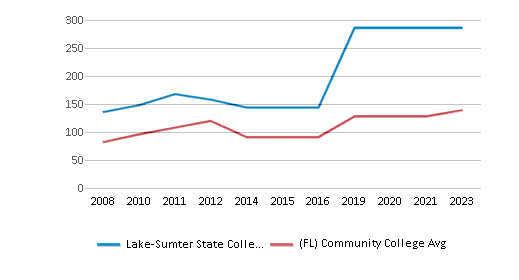
School Calendar
Student Body
The student population of Lake-Sumter State College has grown by 22% over five years.
The student:teacher ratio of 21:1 has increased from 17:1 over five years.
The Lake-Sumter State College diversity score of 0.67 is less than the state average of 0.76. The school's diversity has stayed relatively flat over five years.
Total Enrollment
5,944 students
646 students
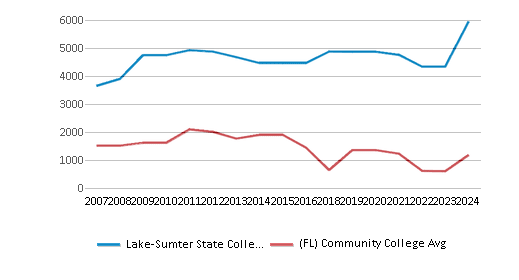
Student : Teacher Ratio
21:1
20:1
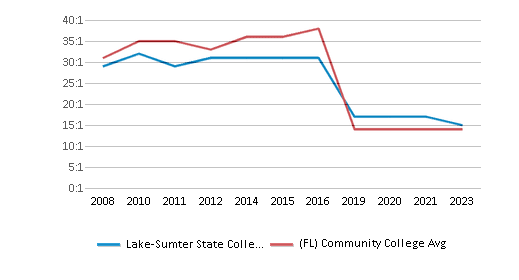
# Full-Time Students
2,144 students
587 students
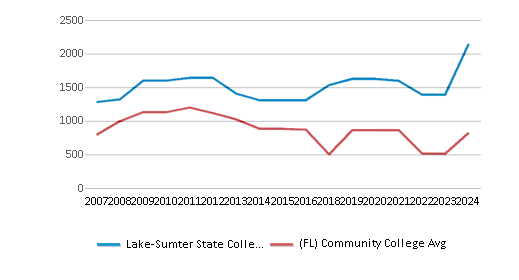
# Part-Time Students
3,800 students
557 students
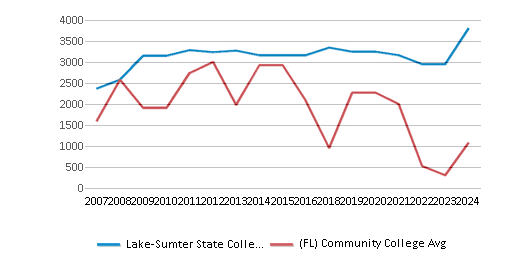
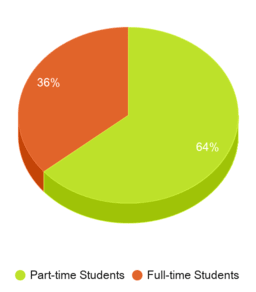
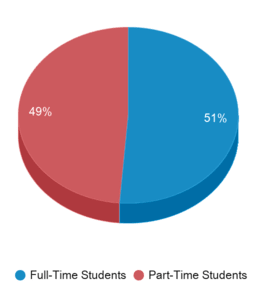
# Enrollment Undergraduate
594 students
261 students
# Full-Time Undergraduate Students
2,144 students
574 students
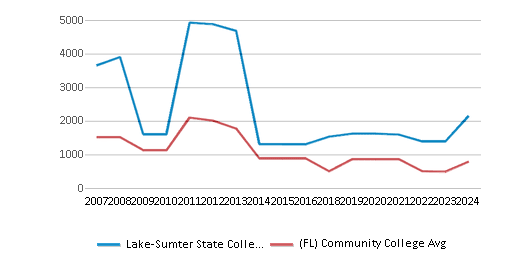
# Full-Time Graduate Students
n/a
85 students
# Part-Time Undergraduate Students
3,800 students
648 students
# Part-Time Graduate Students
n/a
36 students
Total Dormitory Capacity
n/a
174 students
% American Indian/Alaskan
1%
n/a
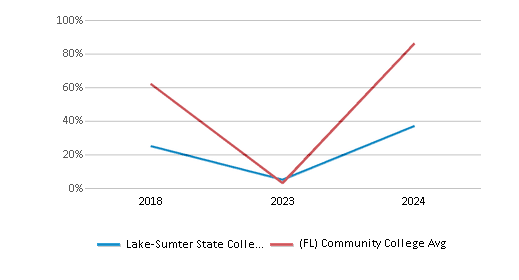
% Asian
5%
5%
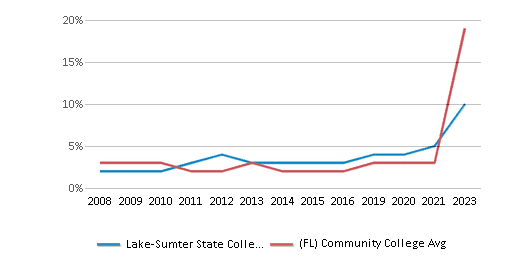
% Hispanic
24%
30%
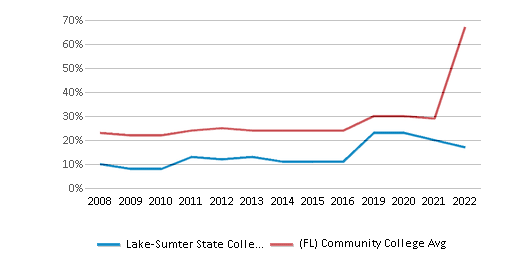
% Black
11%
19%
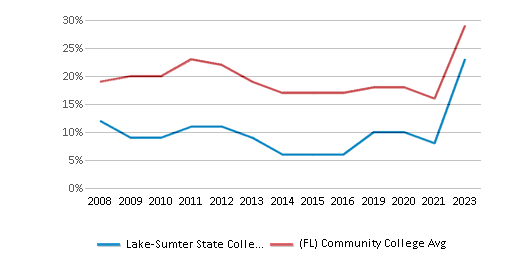
% White
51%
33%
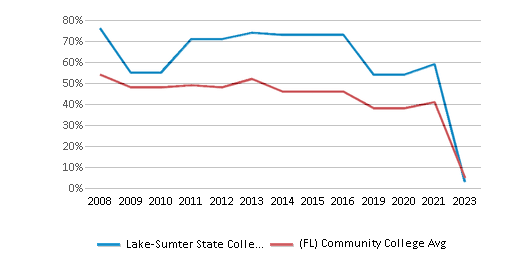
% Hawaiian
n/a
2%
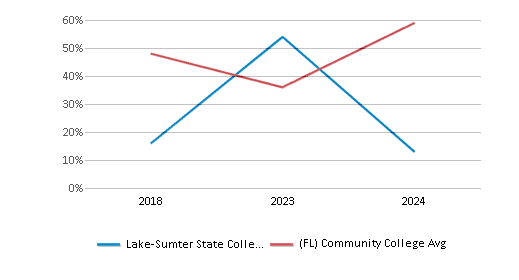
% Two or more races
4%
4%
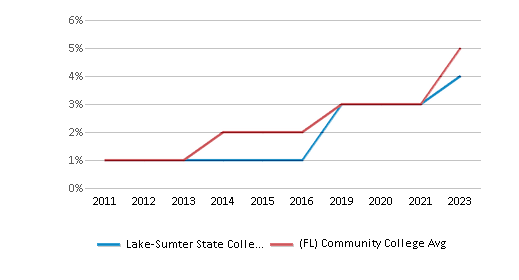
% Non Resident races
1%
2%
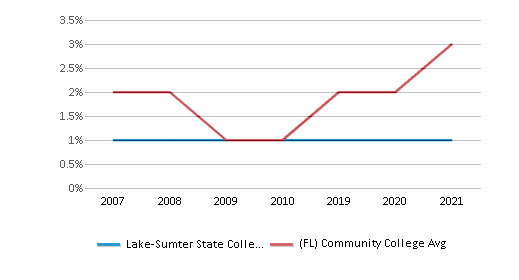
% Unknown races
4%
5%
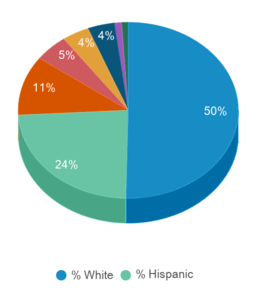
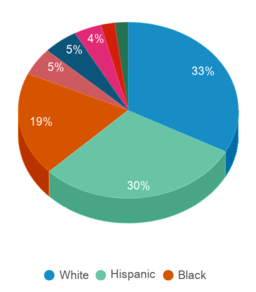
Diversity Score
0.67
0.76
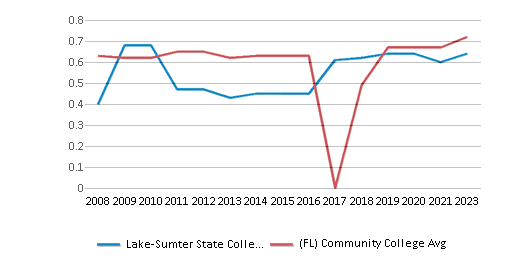
College Completion Rate (Students who graduate in less than 4 years)
40%
50%
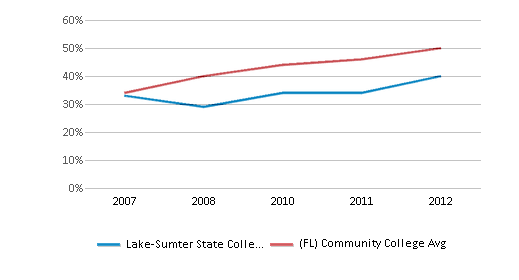
College Completion Rate (Students who graduate in 4 years or more than 4 years)
0.4686%
0.4334%
Average Graduate Earnings (10 Years)
$31,400
$31,500
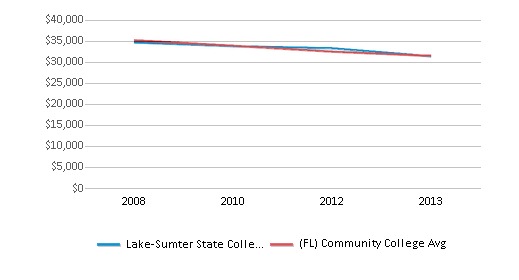
Tuition and Acceptance Rate
The public in-state tuition of $3,172 is less than the state average of $3,280. The in-state tuition has stayed relatively flat over four years.
The public out-state tuition of $13,276 is more than the state average of $10,578. The out-state tuition has stayed relatively flat over four years.
In-State Tuition Fees
$3,172
$3,280
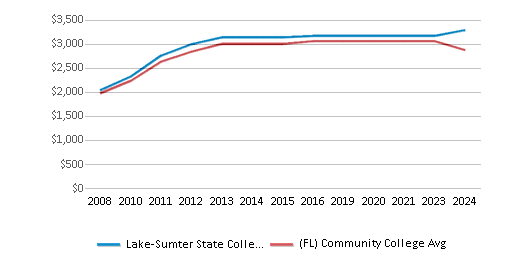
Out-State Tuition Fees
$13,276
$10,578
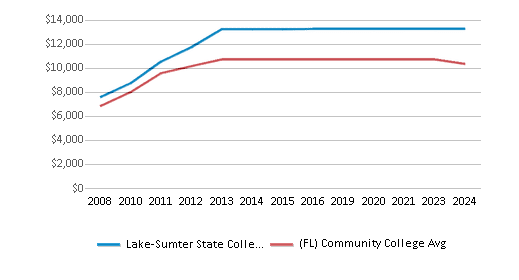
% Students Receiving Some Financial Aid
85%
88%
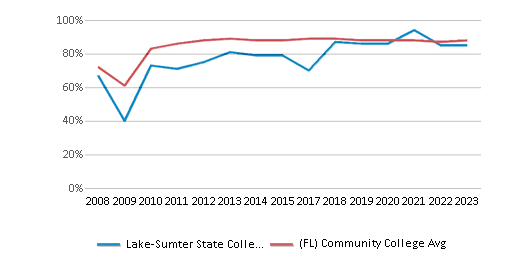
Median Debt for Graduates
$6,750
$9,750
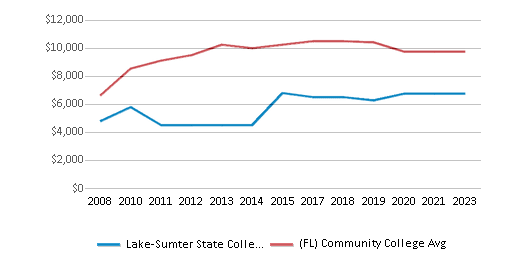
Median Debt for Dropouts
$3,500
$5,500
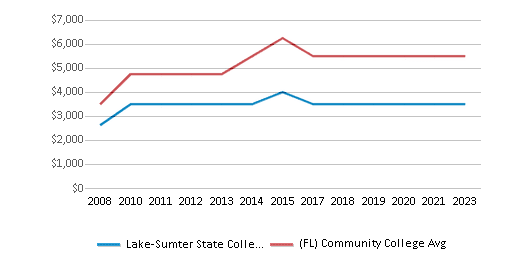
Acceptance Rate
n/a
94%
SAT Reading
n/a
442
SAT Math
n/a
429
ACT Composite
n/a
18
ACT English
n/a
18
ACT Math
n/a
18
Source: 2024 (or latest year available) Integrated Postsecondary Education Data System (IPEDS)
School Notes
- The Leesburg Campus began with a 70 acre site on U.S. Highway 441, across from the Leesburg Municipal Airport and bordering on beautiful Silver Lake. With the help and assistance of leading citizens, educators, and political figures, the college rapidly expanded and outgrew this site. In 1992 neighboring property was purchased for future expansion, enlarging the campus to 114 acres. LSCC offers Associate in Arts (A.A.), Associate in Applied Science (A.A.S.), and Associate in Science (A.S.) degrees, and college credit certificate programs. Non-credit vocational supplemental courses are also offered. Complementing its academic offerings, LSCC features a variety of athletic, leisure time, personal enrichment and cultural entertainment programs and activities. In addition to ongoing intramural athletic activities, intercollegiate athletics were begun in the fall of 1998. LSCC participates in district and statewide competition in the following sports: women's volleyball, men's baseball, and women's softball. Located near the geographic center of Florida, LSCC campuses are surrounded by rolling hills, marshlands abounding with wildlife, rural pastureland, and fast-growing residential and business areas. With more than 1,400 named lakes, the Lake-Sumter area offers many outdoor recreation areas with suburban-type living. Among the major facilities are modern classrooms and laboratories, a library, Learning Center, the Paul P. Williams Fine Arts Complex, the Student Services Building, a student center, a Sports Complex, the Everett A. Kelly Convocation Center with a gymnasium, and the Magnolia Room banquet/conference facility. In January 2002, the new 31,800 sq. ft. Health Sciences Center opened for state-of-the-art health care programs in Nursing, Health Information Management and Dental Assisting. The facility includes classrooms, a nursing skills lab, library and offices as well as a 1500 sq. ft. fitness center, a 100 seat auditorium and a 40 seat community room.
Frequently Asked Questions
How much does Lake-Sumter State College cost?
Lake-Sumter State College's tuition is approximately $3,172 for In-State students and $13,276 for Out-State students.
What is Lake-Sumter State College's ranking?
Lake-Sumter State College ranks among the top 20% of community college in Florida for: Least debt for graduating students.
Recent Articles

Obtaining Your Bachelor's Degree at a Community College
Explore the evolving landscape of community colleges offering bachelor's degrees, addressing affordability, accessibility, and workforce needs.

A to Z of Community College Certificates and Courses
From business and healthcare to technology and skilled trades, the article showcases the breadth of options available to students seeking to enhance their knowledge, develop new skills, or pursue career advancement.

What is a Community College?
This comprehensive guide explains what a community college is, its history, and its role in higher education. It covers the types of programs offered, differences from four-year colleges, benefits of attending, and important considerations for prospective students, providing valuable insights for those exploring educational options.









